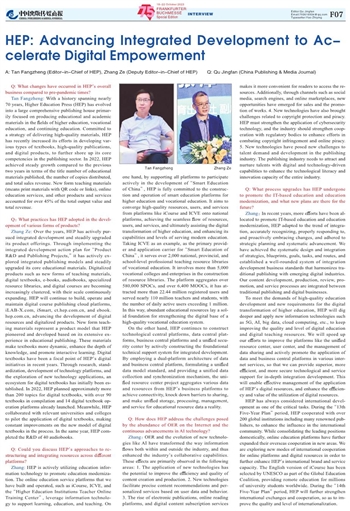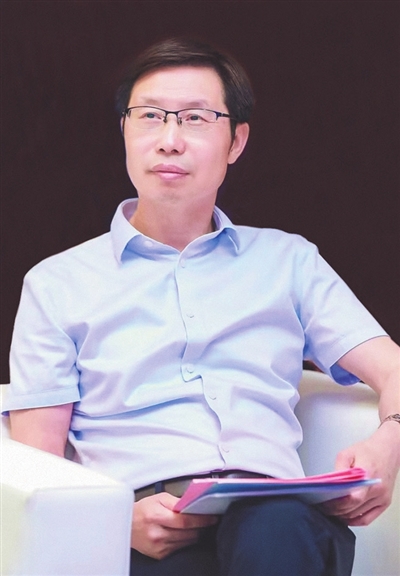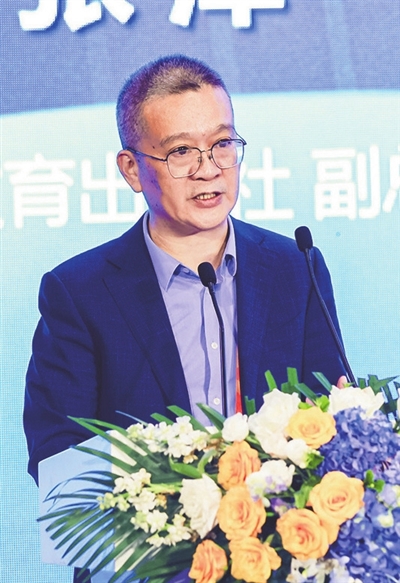A: Tan Fangzheng (Editor-in-Chief of HEP), Zhang Ze (Deputy Editor-in-Chief of HEP) Q: Qu Jingfan (China Publishing & Media Journal)
Q: What changes have occurred in HEP’s overall business compared to pre-pandemic times?Tan Fangzheng: With a history spanning nearly 70 years, Higher Education Press (HEP) has evolved into a large comprehensive publishing house primar-ily focused on producing educational and academic materials in the fields of higher education, vocational education, and continuing education. Committed to a strategy of delivering high-quality materials, HEP has recently increased its efforts in developing var-ious types of textbooks, high-quality publications, and digital products, to further shore up its core competencies in the publishing sector. In 2022, HEP achieved steady growth compared to the previous two years in terms of the title number of educational materials published, the number of copies distributed, and total sales revenue. New form teaching materials (means print materials with QR code or links), online education services, and other products and services accounted for over 45% of the total output value and total revenue.
Q:What practices has HEP adopted in the devel-opment of various forms of products?
Zhang Ze: Over the years, HEP has actively pur-sued integrated development and steadily upgraded its product offerings. Through implementing the integrated development action plan for “Product R&D and Publishing Projects,” it has actively ex-plored integrated publishing models and steadily upgraded its core educational materials. Digitalized products such as new forms of teaching materials, digital textbooks, e-books, audiobooks, specialized resource libraries, and digital courses are becoming increasingly clustered, with their scale continuously expanding. HEP will continue to build, operate and maintain digital course publishing cloud platforms, iLAB-X.com, iSmart, ct.hep.com.cn, and ebook.hep.com.cn, advancing the development of digital resources and digitalized products. New form teach-ing materials represent a product model that HEP pioneered and developed based on its extensive ex-perience in educational publishing. These materials make textbooks more dynamic, enhance the depth of knowledge, and promote interactive learning. Digital textbooks have been a focal point of HEP’s digital initiatives in recent years. Through research, stand-ardization, development of technology platforms, and the exploration of new technology applications, an ecosystem for digital textbooks has initially been es-tablished. In 2022, HEP planned approximately more than 200 topics for digital textbooks, with over 90 textbooks in compilation and 14 digital textbook op-eration platforms already launched. Meanwhile, HEP collaborated with relevant universities and colleges to pilot the application of digital textbooks, making constant improvements on the new model of digital textbooks in the process. In the same year, HEP com-pleted the R&D of 40 audiobooks.
Q: Could you discuss HEP’s approaches to re-structuring and integrating resources across different platforms?
Zhang: HEP is actively utilizing education infor-mation technology to promote education moderniza-tion. The online education service platforms that we have built and operated, such as iCourse, ICVE, and the “Higher Education Institutions Teacher Online Training Center”, leverage information technolo-gy to support learning, education, and teaching. On
one hand, by supporting all platforms to participate actively in the development of “Smart Education of China”, HEP is fully committed to the construc-tion and operation of smart education platforms for higher education and vocational education. It aims to converge high-quality resources, users, and services from platforms like iCourse and ICVE onto national platforms, achieving the seamless flow of resources, users, and services, and ultimately assisting the digital transformation of higher education, and enhancing its capabilities and levels of serving modern education. Taking ICVE as an example, as the primary provid-er and application carrier for “Smart Education of China”, it serves over 2,000 national, provincial, and school-level professional teaching resource libraries of vocational education. It involves more than 5,000 vocational colleges and enterprises in the construction of resource libraries. The platform aggregates over 580,000 SPOCs, and over 6,400 MOOCs, it has at-tracted more than 22.44 million registered users and served nearly 110 million teachers and students, with the number of daily active users exceeding 1 million. In this way, abundant educational resources lay a sol-id foundation for strengthening the digital base of a high-quality vocational education system.On the other hand, HEP continues to construct technological central platforms, data central plat-forms, business central platforms and a unified secu-rity center by actively constructing the foundational technical support system for integrated development. By employing a dual-platform architecture of data and business central platform, formulating a unified data model standard, and providing a unified data collection and synchronization mechanism, the uni-fied resource center project aggregates various data and resources from HEP’s business platforms to achieve connectivity, knock down barriers to sharing, and make unified storage, processing, management, and service for educational resource data a reality.
Q: How does HEP address the challenges posed by the abundance of OER on the Internet and the continuous advancements in AI technology?
Zhang:OER and the evolution of new technolo-gies like AI have transformed the way information flows both within and outside the industry, and thus enhanced the industry’s collaborative capabilities. These effects are primarily observed in the following areas: 1. The application of new technologies has the potential to improve the efficiency and quality of content creation and production. 2. New technologies facilitate precise content recommendations and per-sonalized services based on user data and behavior. 3. The rise of electronic publications, online reading platforms, and digital content subscription services
makes it more convenient for readers to access the re-sources. Additionally, through channels such as social media, search engines, and online marketplaces, new opportunities have emerged for sales and the promo-tion of works. 4. New technologies have also brought challenges related to copyright protection and piracy. HEP must strengthen the application of cybersecurity technology, and the industry should strengthen coop-eration with regulatory bodies to enhance efforts in combating copyright infringement and online piracy. 5. New technologies have posed new challenges to talent demand and development in the publishing industry. The publishing industry needs to attract and nurture talents with digital and technology-driven capabilities to enhance the technological literacy and innovation capacity of the entire industry.
Q: What process upgrades has HEP undergone to promote the IT-based education and education modernization, and what new plans are there for the future?Zhang:In recent years, more efforts have been al-located to promote IT-based education and education modernization, HEP adapted to the trend of integra-tion, accurately recognizing, properly responding to, and proactively embracing changes, and adhered to strategic planning and systematic advancement. We have achieved the systematic design and integration of strategies, blueprints, goals, tasks, and routes, and established a well-rounded system of integration development business standards that harmonizes tra-ditional publishing with emerging digital industries. Our content development, production, review, pro-motion, and service processes are integrated between traditional publishing and digital businesses.To meet the demands of high-quality education development and new requirements for the digital transformation of higher education, HEP will dig deeper and apply new information technologies such as 5G, AI, big data, cloud computing, etc., to keep improving the quality and level of digital education and digital teaching resources. We will speed up our efforts to improve the platforms like the unified resource center, user center, and the management of data sharing and actively promote the application of data and business central platforms in various inter-net services, so that we can provide superior, more efficient, and more secure technological and service support for in-depth integration development. This will enable effective management of the application of HEP’s digital resources, and enhance the efficien-cy and value of the utilization of digital resources.HEP has always considered international devel-opment as one of the critical tasks. During the “13th Five-Year Plan” period, HEP cooperated with over 200 global institutions including many renowned pub-lishers, to enhance the influence in the international community. While consolidating the leading positions domestically, online education platforms have further expanded their overseas cooperation in new areas. We are exploring new modes of international cooperation for online platforms and digital resources in order to further enhance HEP’s international brand and service capacity. The English version of iCourse has been selected by UNESCO as part of the Global Education Coalition, providing remote education for millions of university students worldwide. During the “14th Five-Year Plan” period, HEP will further strengthen international exchanges and cooperation, so as to im-prove the quality and level of internationalization.




